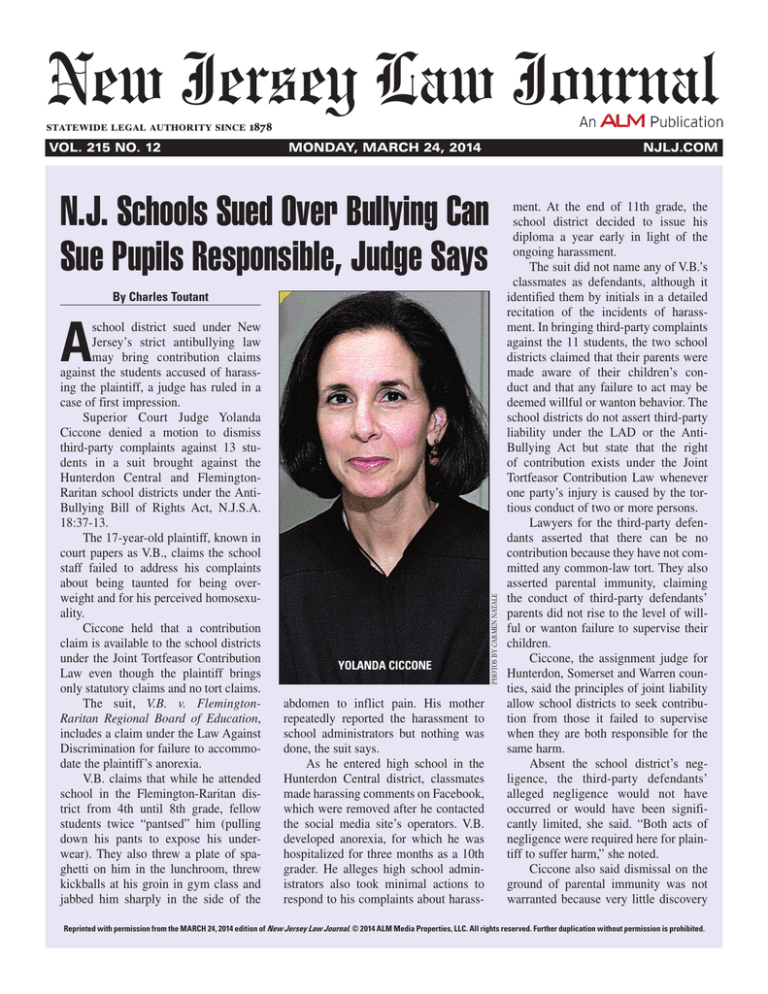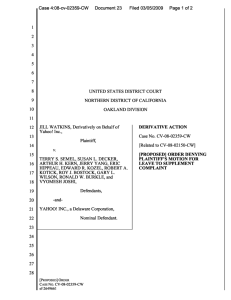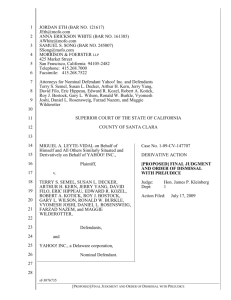
New Jersey Law Journal
statewide legal authority since 1878
VOL. 215 NO. 12
MONDAY, MARCH 24, 2014
NJLJ.COM
N.J. Schools Sued Over Bullying Can
Sue Pupils Responsible, Judge Says
By Charles Toutant
YOLANDA CICCONE
abdomen to inflict pain. His mother
repeatedly reported the harassment to
school administrators but nothing was
done, the suit says.
As he entered high school in the
Hunterdon Central district, classmates
made harassing comments on Facebook,
which were removed after he contacted
the social media site’s operators. V.B.
developed anorexia, for which he was
hospitalized for three months as a 10th
grader. He alleges high school administrators also took minimal actions to
respond to his complaints about harass-
PHOTOS BY CARMEN NATALE
A
school district sued under New
Jersey’s strict antibullying law
may bring contribution claims
against the students accused of harassing the plaintiff, a judge has ruled in a
case of first impression.
Superior Court Judge Yolanda
Ciccone denied a motion to dismiss
third-party complaints against 13 students in a suit brought against the
Hunterdon Central and FlemingtonRaritan school districts under the AntiBullying Bill of Rights Act, N.J.S.A.
18:37-13.
The 17-year-old plaintiff, known in
court papers as V.B., claims the school
staff failed to address his complaints
about being taunted for being overweight and for his perceived homosexuality.
Ciccone held that a contribution
claim is available to the school districts
under the Joint Tortfeasor Contribution
Law even though the plaintiff brings
only statutory claims and no tort claims.
The suit, V.B. v. FlemingtonRaritan Regional Board of Education,
includes a claim under the Law Against
Discrimination for failure to accommodate the plaintiff’s anorexia.
V.B. claims that while he attended
school in the Flemington-Raritan district from 4th until 8th grade, fellow
students twice “pantsed” him (pulling
down his pants to expose his underwear). They also threw a plate of spaghetti on him in the lunchroom, threw
kickballs at his groin in gym class and
jabbed him sharply in the side of the
ment. At the end of 11th grade, the
school district decided to issue his
diploma a year early in light of the
ongoing harassment.
The suit did not name any of V.B.’s
classmates as defendants, although it
identified them by initials in a detailed
recitation of the incidents of harassment. In bringing third-party complaints
against the 11 students, the two school
districts claimed that their parents were
made aware of their children’s conduct and that any failure to act may be
deemed willful or wanton behavior. The
school districts do not assert third-party
liability under the LAD or the AntiBullying Act but state that the right
of contribution exists under the Joint
Tortfeasor Contribution Law whenever
one party’s injury is caused by the tortious conduct of two or more persons.
Lawyers for the third-party defendants asserted that there can be no
contribution because they have not committed any common-law tort. They also
asserted parental immunity, claiming
the conduct of third-party defendants’
parents did not rise to the level of willful or wanton failure to supervise their
children.
Ciccone, the assignment judge for
Hunterdon, Somerset and Warren counties, said the principles of joint liability
allow school districts to seek contribution from those it failed to supervise
when they are both responsible for the
same harm.
Absent the school district’s negligence, the third-party defendants’
alleged negligence would not have
occurred or would have been significantly limited, she said. “Both acts of
negligence were required here for plaintiff to suffer harm,” she noted.
Ciccone also said dismissal on the
ground of parental immunity was not
warranted because very little discovery
Reprinted with permission from the MARCH 24, 2014 edition of New Jersey Law Journal. © 2014 ALM Media Properties, LLC. All rights reserved. Further duplication without permission is prohibited.
215 N.J.L.J. 809
NEW JERSEY LAW JOURNAL, MARCH 24, 2014
has been conducted in the case.
Steven Parness of Methfessel &
Werbel in Edison, who represents one of
the third-party defendants, says, “While
we disagree with the ruling, we respect
the court’s decision and look forward to
moving for summary judgment for our
clients at the close of discovery.”
Other lawyers for the third-party
defendants did not return calls.
Jeffrey Schanaberger of Hill
Wallack in Princeton, representing the
Flemington-Raritan school district, says
he came up with the idea of the thirdparty claims.
“Our pitch to the court was, had the
plaintiff used these very same facts and
pled a count for negligent supervision,
there would be no question that a right of
contribution existed,” Schanaberger says.
“Our argument was simply that the label
the plaintiff chooses to put on this cause
of action shouldn’t control.”
The lawyer for the Hunterdon
Central district, Robert Gold of Gold,
Albanese & Barletti in Morristown,
says bringing the perpetrators into the
case is “appropriate when you look at
PHOTO COURTESY OF ROBERT GOLD
ROBERT GOLD
the source of the problem—it’s these
children who are allegedly abusing the
one child.”
Plaintiff lawyer Brian Cige, a
Somerville solo, says the ruling “is going
to complicate litigating the case. But
beyond the facts of this particular case, I
think it’s going to send a positive message
to parents and kids to be responsible.”
David Rubin, a Metuchen lawyer
who represents school districts and
serves as antibullying coordinator for the
Piscataway district, says the ruling leaves
open the question of what legal standard
those students and their parents can be
held to.
“It’s a decision, on the face of it,
that involves a narrow legal issue, but
one that could have widespread practical
ramifications in the school community
because it exposed the bulliers to potential liability as well,” Rubin says. “And
maybe if this decision stands, perhaps in
some way it will encourage families to be
more vigilant about their own children’s
behavior.”
Rubin says the impact of the decision in individual cases would depend on
whether an insurance carrier or a school
district is calling the shots. Some school
districts are reluctant to include children
as witnesses in legal proceedings such as
tenure hearings, even if it may help the
district’s position, he says. ■
Contact the reporter at ctoutant@
alm.com.
2




